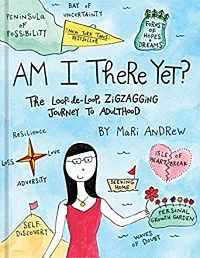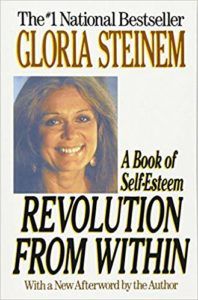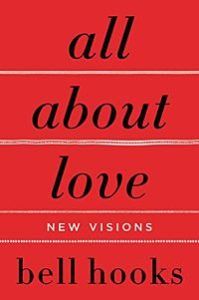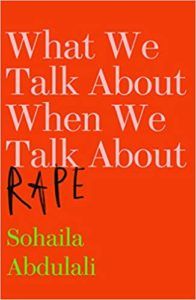
4 Books That Are Not About Depression But Helped Me Anyway
There is no greater feeling in the world than going to bed knowing you matter and you’re loved. This assuring feeling reminds one of home. For many of us this feeling is a luxury. There is nothing more debilitating than feeling empty and lonely even when one is surrounded by people. So, here is a list of four books that made me feel less broken.
 Am I There Yet? The Loop-de-Loop, Zigzagging Journey to Adulthood by Mari Andrew
Am I There Yet? The Loop-de-Loop, Zigzagging Journey to Adulthood by Mari Andrew
Even though this book mainly caters to 20-something-year-olds, it can be read by people of all age groups as there is no age limit for feeling lost. Fortifying yourself against negative self talk is way harder than you might think. Spiraling down the black hole of self pity and feeling shitty later for whiling away your time is a vicious cycle that never ends. Mari Andrew here validates all these hangups, thus making you feel seen and heard. Your anxieties are not super specific to you and realizing this for the first time does take a great load off. I keep on revisiting this book as it makes me feel understood. She has given me an invisible community to fall back on, on days when sunshine seems like a distant dream. This book will make you feel less lonely and leave you with a gratifying wholeness that is an alien concept for many of us.
 Revolution from Within by Gloria Steinem
Revolution from Within by Gloria Steinem
In this iconic self-help book Gloria Steinem talks about how cultivating a healthy level of self-esteem in world leaders can act as an antidote to totalitarian regimes. Leaders who lack self-esteem condone war mongering to satiate their fragile egos. Unfortunately their quest for power never ends as there is a gap in their core values. Steinem has also dedicated a lot of pages to feminism and how women are socialized to doubt their potential, thus leaving the spotlight for their male counterparts. My favorite chapter was the one on childhood. As adults, especially those of us who come from dysfunctional families, we often recreate patterns of our childhood in our adult lives. This often result in women looking for a father in future lovers or tolerating abuse because it feels familiar. Many of us have been conditioned to equate abuse with love, thanks to absentee and abusive parents. Steinem suggests a bunch of helpful techniques, like meditation and journeying ‘into the unconscious’, to help one break out of old patterns that are detrimental to a person’s mental health. This will also aid in parenting our inner child who still feels unloved and unappreciated.
 All About Love by bell hooks
All About Love by bell hooks
In our contemporary world, women are held culpable of being overly emotional whereas men are socialized against showing emotions to get a societal certification of their machismo. In All About Love, bell hooks denounces this faulty system that we’re all partaking in, intentionally or unwittingly, and provides a fresh perspective on love. She lists new ways of loving and how and why it is important to live by a love ethic. In a society where numbing oneself to feelings is considered ‘cool’, hooks promotes the value of not just romantic but also platonic and spiritual love. I personally have been succumbing to the definition of a ‘cool girl’ (the kind Gillian Flynn talks about in Gone Girl) for as long as I can remember and frankly, it hasn’t served me in any way. Projecting a false self and hiding my need for feeling loved was stultifying to say the least, and hooks invalidated my notion that wanting to feel loved somehow makes me weak. It is a basic human need and the more we deny it the more inimical it is to our mental well being.
 What We Talk About When We Talk About Rape by Sohaila Abdulali
What We Talk About When We Talk About Rape by Sohaila Abdulali
In India, just like most countries, discussion of rape is still a taboo. When the #metoo movement was happening in Hollywood, people were bent on discrediting the lived experiences of victims. Things like “why didn’t she open up when it happened”, “She was literally asking for it”, “How can he get raped! Guys don’t get raped”, etc., were the instinctive responses of most people. Being a survivor of sexual assault myself, this casual insensitivity weighed me down. This book was a very cathartic read as Sohaila Abdulali talks about being a victim of gang rape here. She survived and went on to live a well-rounded life. This book was deeply personal and raw – just the kind of read I needed when the world was telling me I should shut up as my trauma isn’t valid.
While nothing beats good old therapy to bring us out of our cocoon of depression, for those of us who can’t afford it, books can act as a substitute. I personally feel that time never heals your emotional scab completely. It just teaches you how to live alongside it. Books however do help you heal. On days when nothing made sense and getting myself out of bed seemed impossible, I found my community in these books. I feel like I share a certain kinship with these authors whom I don’t know in real life and this feeling is very precious. I hope they do the same for you!




 Revolution from Within
Revolution from Within
 What We Talk About When We Talk About Rape
What We Talk About When We Talk About Rape










